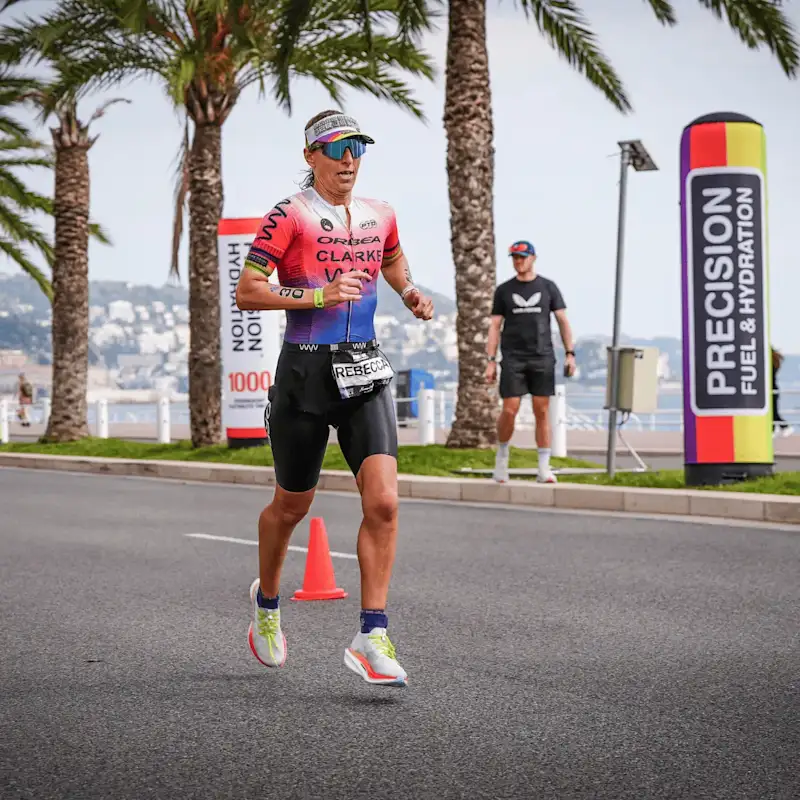
Rebecca Clarke
Tauranga Half
Rebecca's headline numbers
Rebecca's strategy
Fueling
Carbohydrate is the main fuel you burn when racing. Failing to fuel properly is a leading cause of underperformance in longer races.
After a fantastic swim, Rebecca relied on her usual fuel bottle on the bike containing one PF 90 Gel, one PF 30 Caffeine Gel and ~250ml of water. When creating her plan for the run, she assumed she would pick up some cola from the aid stations to supplement her carb intake alongside the PF 30 Caffeine Gels she carried with her. Going forward, increasing her carb intake towards the 90g/h recommendations may deliver higher energy levels and benefit her race performance. Performing some gut training during race-specific training sessions should help Rebecca manage these higher carb intakes, putting her within the scientific recommendations for a race of this intensity and duration.
Hydration
Taking on board an appropriate amount of fluid and sodium is essential to maintaining blood volume and supporting the cardiovascular effort needed to perform on race day.
Whilst the absolute amount of sodium and fluid consumed per hour is important, it’s critical to consider these in relation to each other. This is known as 'relative sodium concentration' and it’s expressed in milligrams per litre (mg/L). How much sodium you’re taking in per litre of fluid is more important than the absolute amount taken in per hour.
Sweat sodium concentration (mg/L) is largely genetically determined and remains relatively stable. Knowing how salty your sweat is enables you to replace a good proportion of your sweat losses, which can range from 200-2,000mg/L.
Whilst Rebecca’s losses are on the low side, getting her hydration strategy right is still crucial when it’s hot and/or humid as her higher sweat rate in these conditions can result in significant net losses over the duration of a race.
Learn moreAlthough she drank electrolytes on the morning of the race, Rebecca might want to consider using PH 1500, rather than PH 1000, particularly in really hot conditions, to ensure she optimises her preload. After losing a bottle going over a speedbump just 3km into the bike, she made the executive call to stop and collect it since it had important electrolytes in it! With the first aid station not positioned until 32km into the course and it being a reasonably warm day, this was definitely a good call. As someone with a moderate sweat sodium concentration, Rebecca used PH 1000 and PF Carb & Electrolyte Drink Mix to account for her hydration needs. This worked well on the day but was largely diluted by the plain water she picked up so could be increased for longer, hotter races where her sweat rate would also be higher and put her at risk of dehydration-related symptoms.
Caffeine
Beyond the Three Levers of Performance (carb, sodium and fluid), caffeine is one of only a few substances that is proven to improve performance for most endurance athletes as it can help stave off mental and physical fatigue.
Rebecca’s caffeine intake was sensibly within the general recommendations to optimally benefit endurance performance. This would have improved both her perception of fatigue and provided some physical performance improvements with that extra energy ‘boost’.
How Rebecca hit her numbers
Here's everything that Rebecca ate and drank on the day...
Rebecca's weapons of choice
Final thoughts
Rebecca's full stats
Data Confidence?
There is an adequate level of accuracy in the data collected and the numbers reported. The athlete manages to recall what they ate and drank including most specifics (brands flavours quantities plausible estimations of volumes). However there are estimations made within the data which affect the overall confidence level in the data reported.